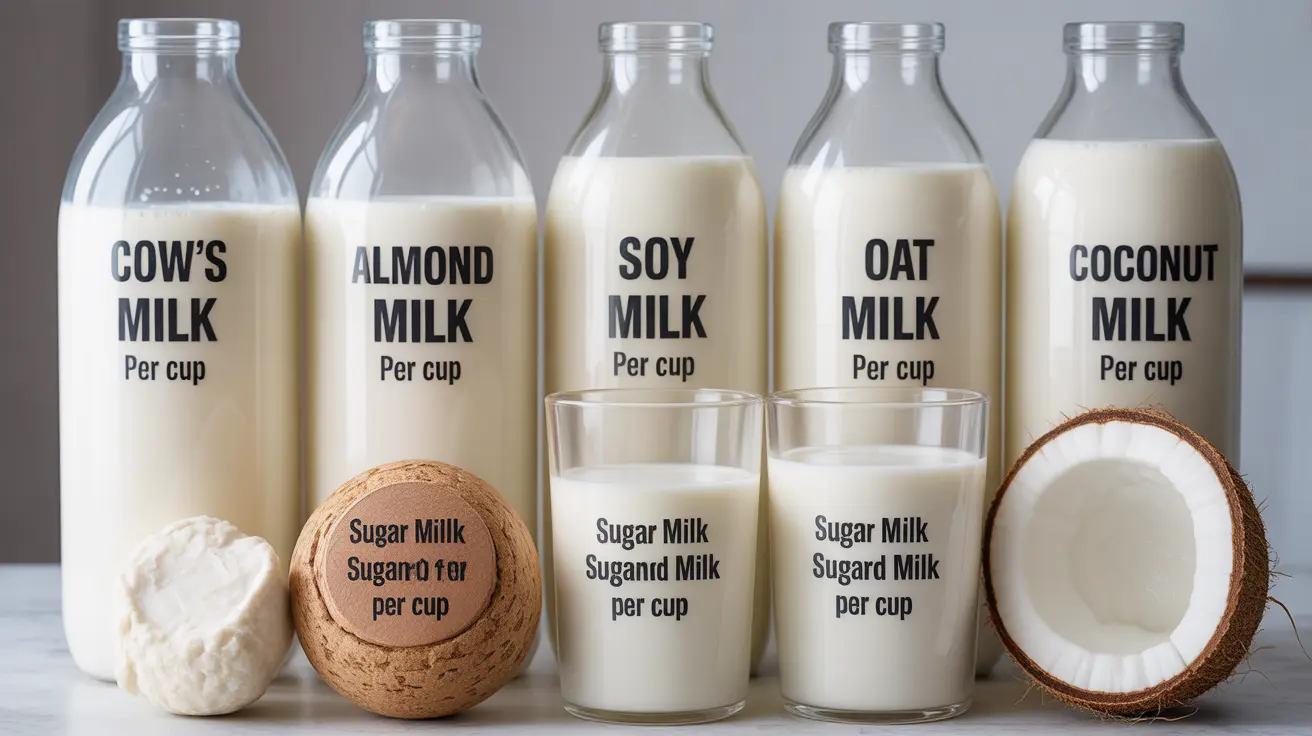When it comes to making healthy beverage choices, understanding the sugar content in milk and milk alternatives is crucial. Whether you're watching your sugar intake, managing diabetes, or simply trying to make informed dietary decisions, knowing how much sugar is naturally present in different types of milk can help you make the best choice for your needs.
In this comprehensive guide, we'll explore the natural and added sugars found in various milk types, their effects on blood sugar, and practical ways to maintain essential nutrient intake while managing sugar consumption.
Natural Sugar Content in Different Milk Types
Cow's milk contains a natural sugar called lactose, with approximately 12-13 grams of sugar per cup (240ml). This sugar content remains consistent across whole, reduced-fat, and skim milk varieties, as the fat removal process doesn't affect lactose levels.
Plant-based milk alternatives vary significantly in their natural sugar content:
- Unsweetened almond milk: 0-1g sugar per cup
- Unsweetened soy milk: 1-2g sugar per cup
- Unsweetened oat milk: 2-3g sugar per cup
- Unsweetened coconut milk: 0-1g sugar per cup
Understanding Lactose vs. Added Sugars
Natural lactose in milk behaves differently in your body compared to added sugars found in flavored milk products. Lactose is a complex sugar that breaks down more slowly during digestion, while added sugars are typically simple sugars that can cause rapid blood sugar spikes.
Flavored milk products often contain significant amounts of added sugars:
- Chocolate milk: 24-28g total sugar per cup
- Strawberry milk: 23-27g total sugar per cup
- Vanilla milk: 20-25g total sugar per cup
Low-Sugar Milk Options
For those monitoring their sugar intake, several alternatives provide essential nutrients with minimal sugar content:
- Lactose-free milk (regular milk with lactase enzyme added)
- Unsweetened plant-based alternatives
- Ultra-filtered milk (reduced sugar through filtration)
Making Smart Milk Choices
When selecting milk products, consider these factors:
- Read nutrition labels carefully
- Choose unsweetened varieties when possible
- Look for products without added sugars
- Consider protein content alongside sugar levels
- Check for fortification in plant-based alternatives
Impact on Blood Sugar Levels
The glycemic impact of milk varies depending on its type and processing. Natural lactose typically causes a slower, more moderate blood sugar response compared to milk products with added sugars. This makes plain milk a better choice for blood sugar management.
Maintaining Nutrient Balance
While managing sugar intake, it's important to ensure you're still getting essential nutrients commonly found in milk:
- Calcium
- Vitamin D
- Protein
- Potassium
- Vitamin B12
Frequently Asked Questions
How much natural sugar is in one cup of cow's milk compared to plant-based milks? Cow's milk contains about 12-13 grams of natural sugar (lactose) per cup, while unsweetened plant-based milks typically contain 0-3 grams of sugar per cup, varying by type.
What is the difference between natural lactose in milk and added sugars in flavored milk? Natural lactose is a complex sugar that digests slowly, while added sugars in flavored milk are simple sugars that can cause rapid blood sugar spikes. Flavored milk often contains both natural lactose and additional sweeteners.
Which types of milk have the lowest sugar content for people watching their sugar intake? Unsweetened almond milk, coconut milk, and other unsweetened plant-based alternatives typically have the lowest sugar content (0-1g per cup). Lactose-free and ultra-filtered dairy milk options also provide lower-sugar alternatives.
How does lactose in milk affect blood sugar levels compared to added sugars? Lactose has a more moderate effect on blood sugar levels because it requires enzymatic breakdown during digestion, while added sugars are absorbed more quickly and can cause sharper blood sugar spikes.
What are the best ways to reduce sugar intake from milk while still getting essential nutrients? Choose unsweetened milk alternatives, opt for lactose-free milk if needed, read nutrition labels carefully, and ensure selected products are fortified with essential nutrients like calcium and vitamin D. Consider ultra-filtered milk options that maintain protein content while reducing sugar.




